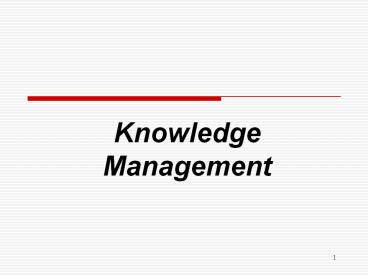Knowledge Management - PowerPoint PPT Presentation
Title:
Knowledge Management
Description:
Knowledge management (KM) is a process that helps ... Tacit knowledge is usually in the domain of subjective, cognitive, and experiential learning. ... – PowerPoint PPT presentation
Number of Views:122
Avg rating:3.0/5.0
Title: Knowledge Management
1
- Knowledge Management
2
Knowledge Management
- Knowledge management (KM) is a process that helps
organizations identify, select, organize,
disseminate, and transfer important information
and expertise that are part of the organizations
memory.
3
Data, Information Knowledge
4
Knowledge Management
- Knowledge is information that is contextual,
relevant, and actionable. - Tacit knowledge is usually in the domain of
subjective, cognitive, and experiential learning.
- Explicit knowledge deals with more objective,
rational, and technical knowledge.
5
By Nonaka and Takeuchi, 1995
6
Knowledge-based Economy
- Rapid changes in the business environment cannot
be handled in traditional ways. - Firms are much larger, with higher turnover and
require better tools for collaboration,
communication, and knowledge sharing. - Firms must develop strategies to sustain
competitive advantage by leveraging their
intellectual assets for optimum performance. - Managing knowledge is now critical for firms
spread out over wide geographical areas, and for
virtual organizations.
7
Sharing Knowledge
- Some reasons people are reluctant to share
knowledge include - No skill in knowledge management techniques.
- Willing to share, but not enough time to do so.
- Dont understand knowledge management and
benefits. - Lack of appropriate technology.
- No commitment from senior managers.
- No funding for knowledge management.
- Culture does not encourage knowledge sharing.
8
Organization Culture
- The ability of an organization to learn, develop
memory, and share knowledge is dependent on its
culture. - Culture is a pattern of shared basic assumptions.
- Over time organizations learn what works and what
doesnt work. As the lessons become second
nature, they become part of the organizational
culture. - Generally when a technology project fails, it is
because the technology does not match the
organizations culture.
9
The Knowledge Management Cycle
- Create knowledge
- Capture knowledge
- Refine knowledge
- Store knowledge
- Manage knowledge
- Disseminate knowledge
10
The Knowledge Management Cycle (cont.)
11
Knowledge Repositories
- Databases. It is possible to structure part of a
knowledge repository as a database. - Data warehouses, large repositories of important
data, can also be used for knowledge management,
especially in conjunction with customer
relationship management (CRM) systems.
12
KM Information Technologies
- The KMS challenge is to identify and integrate
the following three technologies to meet the KM
needs of an organization. - Communication technologies allow users to access
needed knowledge, and to communicate with each
other--especially with experts. - Collaboration technologies provide the means to
perform group work. - Storage technologies use a database management
system to capture, store and manage knowledge.
13
Knowledge Management Benefits
- Reduction in loss of intellectual capital when
people leave the company - Reduction in costs by decreasing the number of
times the company must repeatedly solve the same
problem - Economies of scale in obtaining information from
external providers - Reduction in redundancy of knowledge-based
activities - Increase in productivity by making knowledge
available more quickly easily - Increase in employee satisfaction by enabling
greater personal development and empowerment - Strategic competitive advantage in the
marketplace
14
Managerial Issues Integration
- Since a KM system is an enterprise system, it
must be integrated with other enterprise and
information systems in an organization. - The most important systems to integrate with are
- Decision Support Systems
- Artificial Intelligence
- Databases and Information Systems
- Customer Relationship Management Systems
- Supply Chain Management Systems
- Corporate Intranets and Extranets































